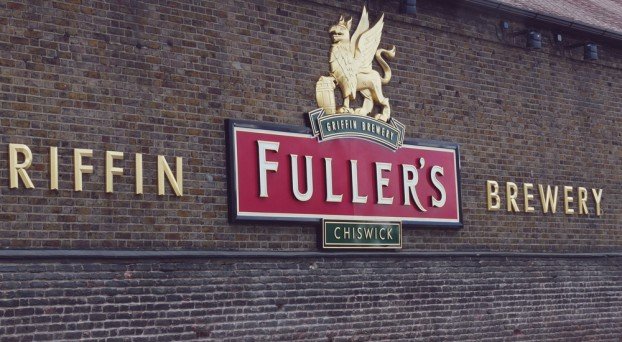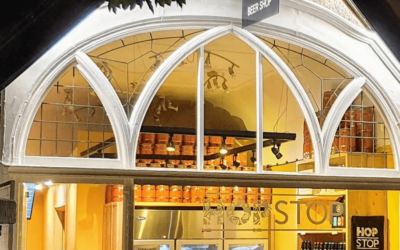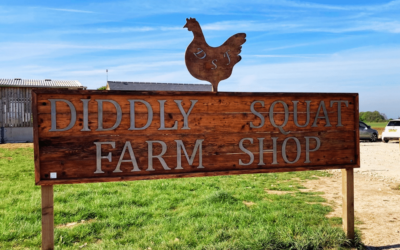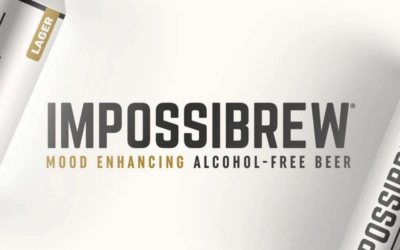“Brewing is about getting it right”. These words are coming out of the mouth of Derek Prentice.
I’m sitting opposite him at Craft Beer Co in Farringdon. He’s easily one of the most experienced brewers in London, maybe the UK, maybe the world, I don’t know. Derek started out at Truman Brewery when he was 18, moved to Young’s in the late 80s, and is currently the brewing manager at Fuller’s. All three breweries are London institutions, on par with The Evening Standard, Harrods and The Underground. Throughout his career he’s worked with, and in some cases been responsible for, some of the most popular ales in the country.
So when he says that brewing is about getting it right, he knows what the hell he’s talking about.
The first thing that strikes you when you talk to Derek is his unhindered enthusiasm. He’s 62 years old but radiates an energy and passion that rivals those half his age. Maybe this is why he gets on so well with a lot of the new young craft brewers. Derek seems to know them all. “Now’s an exciting time to be in brewing. We have the London Brewers’ Alliance and it’s great to listen to the other brewers, to talk with them, to taste their beers, to experience their pluses and their minuses, it’s fantastic.”
The knowledge he brings to the table is The Old Knowledge. The type of knowledge only half a century in the industry can give you.
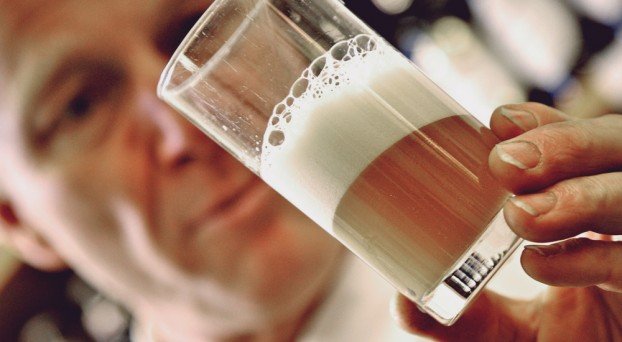
He started his lifelong career with beer when he was 18, at Truman Brewery in Brick Lane. “I was planning to do forestry. I quite fancied the outdoor life and didn’t want to be in an office. While I was waiting to re-sit my Chemistry A level I applied for and got a job in the brewery of Truman’s. In the laboratory. One of the first tasks I had was to assist on the analysis of the barleys, malts and hops. Being a junior I was sent off to grab various samples, speak to the maltser, grain buyers, go to the hop farms. I had a nice time just going around getting samples. It made me think I should have a bit of a career change. I certainly liked beer, especially the consumption side of it, and I wouldn’t get stuck in an office. I also liked the whole process of brewing, which marries agriculture, microbiology and the fermentation techniques in the brew house. All of that appealed to me.”
After a stint in the lab he was asked to join the brewing team. They would brew from 5 or 6 in the morning to about 9 or 10 in the evening, but there would always be someone looking after the fermentation 24 hours. For this purpose they had a flat right there in the brewery. “It was rather nice. We would have a cask of ale in there, a housekeeper would come in on a daily basis to bring some food in. It wasn’t a hardship.”
The old brew house where Derek started out had some seriously antiquated equipment. “It was a wonderful experience to be starting out in brewing in the old Truman brewery. It was a very large brew house. Some of the vessels were over 120 years old.”
This love for the old was not shared by the men on top. After he’d been there for three years they decided that the old brewery was no longer functional and needed to be replaced. In the middle of this renovation Truman’s went through a big takeover and came out on the other side as a part of a major group. They still brewed independently, but some of the old magic was lost. “It was a bit sad really, around the time of the takeover I was at a function with the production director who said “We’ll never brew cask ale in the brewery again. Cask ale is dead.” We produced a lot of light ales for keg. It wasn’t great.” It soon became just a production line, taking on the brewing of such horrific classics as Tuborg and Carlsberg.
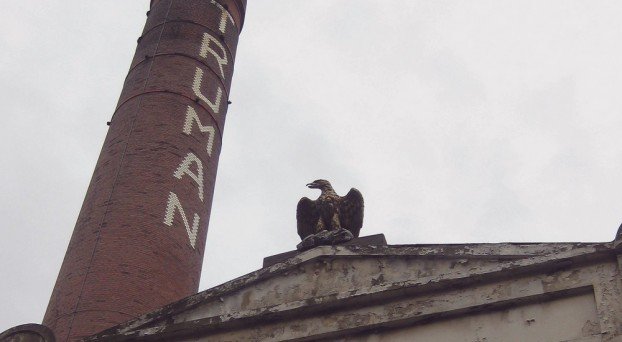
The next few years were his Dark Years.
“That was pretty much the low. It was only about the money. Only about the profit. Only about producing a liquid that no one had any love or passion for.”
I think a lesser man easily would’ve given up on his love for beer and become a salaryman at this point. An indifferent drone content with coldly climbing the career ladder. But the flame that was lit at the old brewery didn’t get extinguished by the years on the production line. If anything he seems to have been able to learn something from it. Something that would help him become the master brewer he is today.
“I like producing beer that people like to drink. I don’t fully subscribe to the notion of ‘I brew the beers that I like to drink’. The thing that gives the brewer the most satisfaction is having someone say that they really enjoyed your beer. It’s not just about what I want to drink, it’s making sure that you can have something you really like.”
“The thing that gives the brewer the most satisfaction is having someone say that they really enjoyed your beer.”
At Young’s, Derek got stuck in, tapping into his Old Knowledge. All the brewers were expected to go in to mash and finish the brew. It was a very hands-on operation. After he joined he helped reintroduce dry hopping and bottle conditioned beer, both of which are old techniques favoured by the young hot brewers today.
There’s especially one beer that he remembers with fondness.
“We took what was already a great beer, the Young’s Export, and gave it the opportunity to express itself far better and far longer in the bottle, to create Special London Ale. For me that was one of the true India Pale Ales. That’s the style of beer I really like. I was recreating the memory of the Ben Truman Pale Ale, from the late 60s, early 70s. My memory might be wearing rose tinted glasses, but it was this wonderful light, hoppy pale ale.”
During his 17 years at Young’s he got to put his mark on their range of beers. As well as the Special London Ale some other highlight were an oatmeal stout and a chocolate stout, and he was involved in improving the Young’s Bitter. Then in 2006 the fun was over. The board announced they were planning to sell the brewery in London and move to Bedford. Derek was not a fan of this at all. He was offered to stay on but decided to move on and was playing with the idea of starting his own brewery. “I could’ve been one of the earlier members of the London Brewers’ Alliance, but my good friend and brewing colleague John Keeling [head brewer at Fuller’s] asked me if I would go over on a short term contract to cover as their brewing manager.”
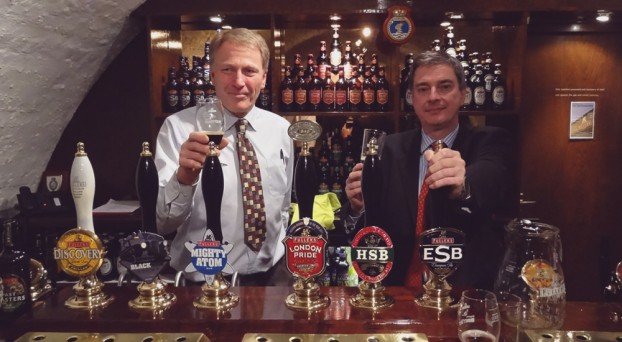
He was still planning to set up his own brewery but when they offered him a full time position it seemed like a safer option and he put his plans on ice. These plans might just thaw back to life in the future though. “It’s helped me sleep through the night not having to run a business. But I won’t deny it, it would be nice to have the opportunity to do more experimentation. When I retire I would love to be involved in a smaller concern, or have a small unit of my own somewhere.
“I’d hate to think I’d finish brewing at the age of 65.”
I’d hate to think I’d finish brewing at the age of 65. It’s been too big a part of my life, and it means too much for me to just walk away from it.” How many people can say that they actually want to carry on doing their job after retirement age? Most people want to quickly head for hotter climes to wither away in the sun. But Derek sees this as his opportunity to brew more freely.
In 2006 there were about 7 breweries left in London. Today there are 48, according to the London Brewers’ Alliance. Derek has seen people come and go, with an emphasis on go. He’s seen so many breweries close down. There’s no wonder he’s loving the recent brewing resurgence. It’s like all his focus and dedication is paying off and his knowledge is being valued by a whole new generation of brewers. But he’s no spectator. He’s used to being hands on. “I’m assisting where I can, when some of these newer lads have some queries or questions, if I in any way can help. Some of them are brewing super beers. I enjoy discussing some of the production issues without compromising the position I hold at Fuller’s. It’s great. Drinking their beers. Commenting on their beers. If I don’t think it’s quite right I might help push them in the right direction.”
At this point I bring up a rumour I’d heard, that Derek had helped Evin at Kernel and taught him how to dry hop. He’s quick to point out that he doesn’t think that he’s taught anyone anything, which sounds like a massive understatement and a declaration of humility. The man’s an oracle. “I might have suggested some other techniques he could try. We discuss different brewing methods. Different ways of doing things. And we do that as a group. I think it’s almost unique in the brewing industry, this sharing of information. I’ve learned from other brewers, I’ve learned from the people at Kernel. They’re in a position to be trying different hop varieties, different yeasts, different styles. Evin is teaching me as well. It’s very much a two way exchange.”
He admits that some of the knowledge he gets from the new brewers gives him ideas that he can incorporate into new products for Fuller’s.
Derek’s voice is about to disappear. He’s been talking almost non-stop for an hour and a half. We decide to stop there and we head to the bar to have a few more drinks. As we sample a few new London brews at the bar he tells me that he’s looking forward to the London’s Brewing Festival, another perfect opportunity for him to catch up on what’s happening.
“Things are going so fast in London, I haven’t had time to catch up with them all. I’m really looking forward to it, to experiencing all the breweries I haven’t had the chance to meet, and to taste their beers.” So if you fancy saying hi to a genuine brewing giant, just drop by the Fuller’s stall on Saturday and look for the man who seems to be enjoying himself more than anyone else.
I’ve never ever met someone at Derek’s age with the same amount of passion and drive. I think most people cling to what they know, especially as they reaching retirement age. Derek is the opposite. It’s amazing. When I suggest that maybe he’s the Godfather of brewing in London he just laughs and says “I like to think of myself still as a young brewer”. And that’s exactly what it feels like talking to him. He’s like a young brewer with a veteran’s experience and knowledge. It’s the ultimate combo.
“I like to think of myself still as a young brewer.”
At the end of the night we’re both a bit tipsy after a bit too much sampling, although I bet Derek has a much better drinking constitution than I have. My head is buzzing with brewing history and Derek’s voice. “I’ve enjoyed brewing throughout my life, it hasn’t made me rich or famous. But I’ve enjoyed what I do, and I still enjoy making beer. I enjoy brewing and what it has given me. I’ve had fantastic opportunities, to express myself in beers, to meet people I really enjoyed and to work for companies I have enormous respect for.” It’s a pitch perfect summary. Now all we have to do is to wait for him to retire so we can taste the beers from his own brewery.
Written by Per Steinar
Image Credits:
A lot of the images in the article were licensed under Creative Commons:
Derek and John by Jeff Alworth
Fullers sign by Ethan Prater
Truman Brewery by Niecieden
Young’s logo by kenjonbro

